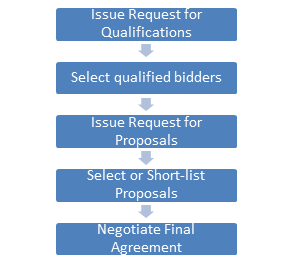
Under the Public-Private Partnerships (P3s) model for procuring highway facilities, a private partner participates in a long-term contract involving some combination of design, construction, financing, operations, and maintenance, including collection of toll revenues. Key issues that public agencies must consider in conducting a P3 project procurement are structuring the agreement, conducting a fair and competitive procurement process, and negotiating a final agreement that is transparent and protects the public interest.
Once public agencies have identified a project as having the potential to be delivered as a P3, they can prepare a project for procurement. This typically involves scoping and preliminary engineering work for the project and specifying elements of the agreement. Agencies typically develop the conceptual structure of an agreement before procurement. The optimal structure of an agreement depends on the characteristics of the project, the goals and capabilities of the public agency, and the incentives and capabilities of potential private partners. Key elements include allocation of responsibilities and risks, financial considerations including compensation mechanisms, concession term, performance standards and performance management processes.
Given the risks and complexity involved in using non-traditional methods of transportation project delivery, choosing the best partner(s) requires due diligence on the part of the public sector. Because of the size, complexity, and length of term of P3 agreements, special procurement processes are needed to ensure there is sufficient and qualified competition.

A public agency may conduct industry outreach to gain a better understanding of private sector capabilities and interests with regard to a particular project. This process may occur prior to the procurement process or once an agency has selected a short list of qualified bidders. This can help an agency understand how to structure a commercially viable project that will generate competitive bids. Agencies may hold information-sharing meetings or workshops with industry representatives in order to describe the basic attributes of the project and of the potential agreement and to obtain participant feedback.
To create a competitive and fair procurement environment, agencies often use a multi-stage, "best value" procurement process that includes a request for qualifications (RFQ), followed by a request for proposals (RFP) and then by negotiations with the preferred bidder. Figure 1 illustrates how this process could occur.
Bid selection can be based on objective criteria, such as the dollar value of the offer, the lowest subsidy or availability payment required, the lowest proposed length of the concession term, or the lowest net present value of gross revenues required. These criteria can be evaluated in conjunction with qualitative factors (i.e., "best value").
Negotiations with the preferred bidder can allow both parties to establish a mutually agreeable project-specific solution to issues identified after the procurement process. This requires skilled legal counsel with expertise in developing long-term, enforceable agreements between the public and private sectors. The negotiation process can help to ensure mutual understanding of both parties regarding the details of the agreement and the smooth implementation and oversight of the project.
Public agencies may use unsolicited proposals as a way of accessing private sector ideas about potential projects that could be commercially viable. Agencies that allow unsolicited proposals have developed various processes to introduce competitiveness and transparency into the procurement process.

Issue Request for Qualifications » Select Qualified Bidders » Issue Request for Proposal » Select or Short-List proposal » Negotiate Final Agreement
There have been criticisms of P3 deals being rushed through without the public or their elected officials understanding the implications. Transparency should be ensured during the procurement process as well as throughout the life of the P3 agreement. In Virginia, P3 proposals are reviewed by an independent review panel comprised of members from stakeholder groups, and affected jurisdictions receive the proposals and have a 60-day period to review them and submit comments.

While public scrutiny of decision-making is important to accountability of government spending, it is also important to maintain confidentiality during the procurement process, in order to provide bidders with incentives to deliver innovative designs at the lowest possible cost and ensure a competitive tendering process. The public sector should be clear up-front about what type of information should remain confidential and provide an explanation as to why confidentiality is necessary during the procurement process. Temporary confidentiality could be balanced with full disclosure of selection criteria, scoring methods, and proposed agreements.
For further Information: See FHWA's Public-Private Partnership (P3) Procurement: A Guide for Public Owners, available at: https://www.fhwa.dot.gov/ipd/p3/
The FHWA Center for Innovative Finance Support is a one-stop clearinghouse for expertise, guidance, research, decision tools, and publications on highway program delivery innovations. Our website, workshops, and myriad resources support transportation professionals in the use of innovative approaches for delivery of highway projects.
The FHWA Center for Innovative Finance Support's P3 program focuses on resources and capacity building for consideration and use of design-build-finance-operate-maintain (DBFOM) concessions funded through tolls or availability payments.
The FHWA Center for Innovative Finance Support's Alternative Project Delivery program provides information on contractual arrangements that allow for greater private participation in infrastructure development by transferring risk and responsibility from public project sponsors to private sector engineers, contractors and investors.
The FHWA Center for Innovative Finance Support's Project Finance program focuses on alternative financing, including State Infrastructure Banks (SIBs), Grant Anticipation Revenue Vehicles (GARVEEs), and Private Activity Bonds (PABs).
The FHWA Center for Innovative Finance Support's Federal Tolling and Pricing program focuses on the use of tolling and other road user charges as a revenue source to fund highway improvements, and the use of variably-priced tolls as a tool to manage congestion.
The FHWA Center for Innovative Finance Support's Value Capture program explores strategies for tapping into the added value that transportation improvements bring to nearby properties as a means to provide new funding for surface transportation improvements.
Thay Bishop, CPA, CTP/CCM
Senior Program Advisor
Center for Innovative Finance Support
61 Forsyth Street, Suite 17T26
Atlanta, GA 30303
(404) 562-3695
Thay.Bishop@dot.gov